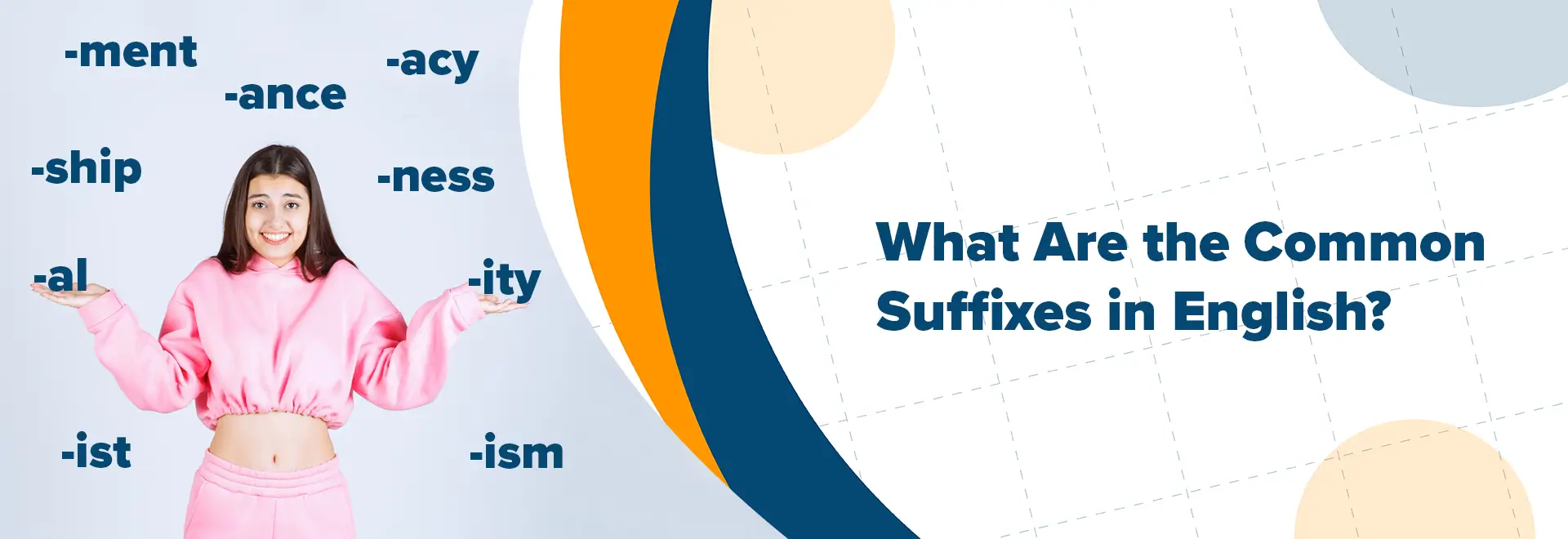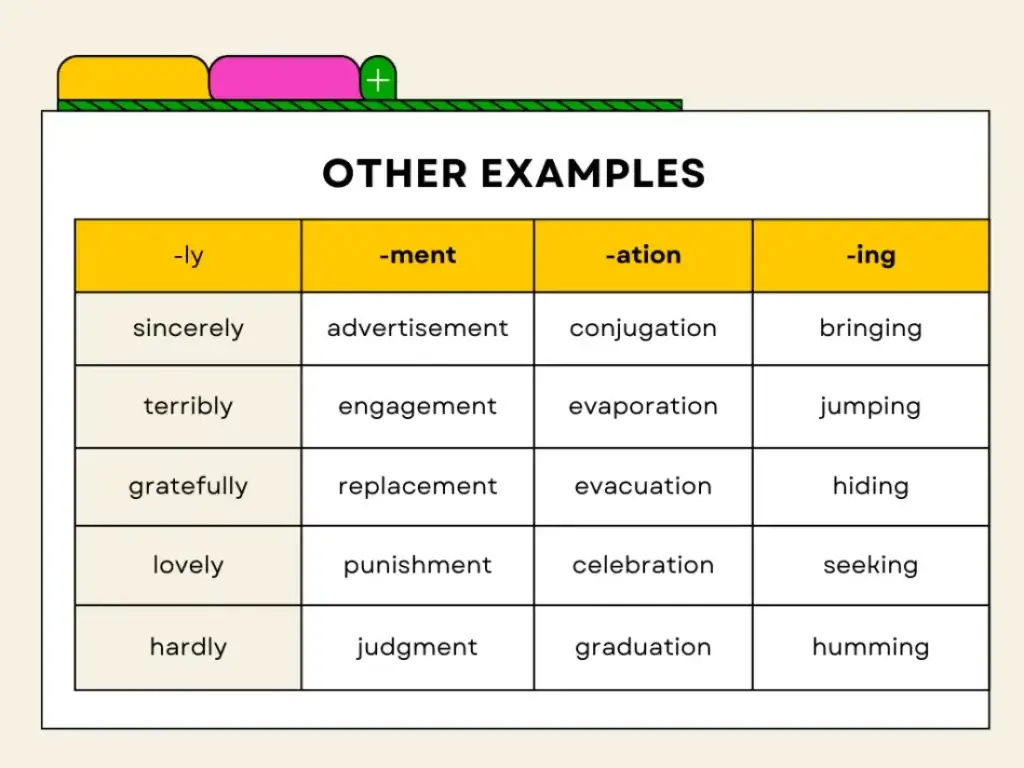
What Are the Common Suffixes in English?
Introduction
Suffixes are essential components of the English language, as they significantly impact the meaning and function of words. By attaching themselves to the end of root words, suffixes alter the word’s tense, part of speech, or meaning. Understanding common suffixes in English is crucial for anyone looking to enhance their language skills and effectively communicate in English.
When it comes to understanding the English language, it’s essential to grasp the concept of suffixes. These small yet powerful elements play a crucial role in shaping words and adding layers of meaning. With this, what exactly are common suffixes in English, and how can they enhance your language skills? Let’s delve into this fascinating linguistic journey and uncover the secrets behind these linguistic building blocks.
What are Suffixes in English?
Before we dive into specific examples, it’s important to establish a foundational understanding of what suffixes are and how they function in the English language. A suffix is a group of letters that can be added to the end of a word to change its meaning or form a new word. By attaching a suffix to a base word, we can modify its grammatical function or convey a different distinction.
Suffixes in English can indicate verb tense, create adjectives, or change a word from singular to plural. By learning some of the most common suffixes, ESL learners can gain insight into the structure and function of English words.
Understanding the Common Suffixes in English
Understanding common suffixes in English is crucial for several reasons. Firstly, it helps individuals decode unfamiliar words by breaking them down into root words and suffixes. This skill is particularly valuable when reading complex texts or learning new vocabulary.
Secondly, knowing common suffixes can aid in language comprehension and communication. By recognizing the function of a suffix, individuals can infer the meaning of a word even if they have never encountered it before. This ability enhances reading comprehension and fosters a deeper understanding of the English language.
Common Suffixes in English and How They Work
As you continue to navigate the complex background of the English language, take a moment to appreciate the reflective impact of common suffixes. Below we introduce you to the common suffixes in English, how they are formed, and what their functions are in sentences.
- –able – This suffix creates adjectives that indicate that something can be done or is capable of something. For example, the word comfortable comes from the root word “comfort” and is a noun. When we add the suffix “-able” to it, it becomes “comfortable” and the part of speech changes to an adjective. Here are some other examples:
Approach – approachable
Remark – remarkable
Consider – considerable
Reason – reasonable
Sustain – sustainable
Some root words that end in specific letters like “y,” “e,” and “ive” change their forms when adding the suffix –able. The “y” or “e” is removed and added with –able. Look at the examples below:
Deny – deniable
Justify – justifiable
Rely – reliable
Vary – variable
Forgive – forgivable
Receive – receivable
Adore – adorable
Believe – Believable
Note – notable
Inflate – inflatable
Some words that end in “e” don’t need to remove the letter “e” as they can only be added with the suffix –able to form an adjective. Below are some examples:
Manage – manageable
Change – changeable
Agree – agreeable
Hire – hireable
Note that other root words end in a consonant like “t” or “p” and are preceded by a vowel letter. These root words are formed as adjectives when added with the suffix –able, but the ending consonant is doubled.
Forget – forgettable
Stop – stoppable
- –ible – This suffix is the same as the suffix –able where it also expresses possibility. Look at the examples below:
Destruct – destructible
Convert – convertible
Resist – resistible
Access – accessible
Notice that words formed using the suffix –ible have two ending consonant letters.
- –ful – This suffix is usually added to a noun to form an adjective. When added to a noun especially ending in the letter “y” preceded by a consonant, the y is dropped and changed to “i.”
Beauty (n) – beautiful
Bounty (n) – bountiful
Duty (n) – dutiful
If the word ends in “y” and is preceded by a vowel letter, the y is no longer dropped. The suffix –ful is automatically added to the word.
Play – playful
Joy – joyful
For regular words normally ending in a vowel letter and a consonant letter respectively or vice versa, the suffix –ful is automatically added. The same is also done with words that have consecutive ending consonant letters.
Cheer – cheerful
Peace – peaceful
Care – careful
Grace – graceful
Power – powerful
Thought – thoughtful
Harm – harmful
Faith – faithful
- –less – The suffix “less” is the opposite of the suffix “ful” and connotes a negative meaning. The suffix -less is added to nouns to indicate the absence of something. For instance, “careless” implies the absence of care, and “fearless” indicates the absence of fear.
Here are other examples of words with the suffix –less.
Point – pointless – meaning no sense
Power – powerless – no power at all
Harm – harmless – causes no harm
Speech – speechless – can’t say anything
Wire – wireless – no need to use any wires to connect to something
- –ly – The suffix “-ly” is commonly used to convert adjectives into adverbs. For example, “quick” becomes “quickly,” infusing the word with the adverbial quality of speed or efficiency. This suffix holds the key to expressing manner, time, place, or degree, enriching the language with its flexible applications.
Adjectives that already end in the suffix –ful are added with the suffix –ly to form an adverb. For example, the word “graceful” becomes “gracefully,” the word “painful” becomes “painfully,” and “joyful” becomes “joyfully”.
- –ment – This very common suffix in English connotes a positive meaning and entails a positive result for a state or quality associated with the action.
For example, “enjoy” transforms into “enjoyment,” encapsulating the state of finding pleasure or delight in something. This suffix enriches the language by providing words with a tangible representation of emotional and experiential states.
Other examples are the following:
Develop – development
Enhance – enhancement
Better – betterment
Achieve – achievement
Disappoint – disappointment
For words ending in “y” preceded by a consonant letter, the y is dropped and changed to the suffix –ment. For example, the word “accompany” is changed to “accompaniment.” For words ending in “y” preceded by a vowel letter, the y is not dropped. For example, the word “employ” becomes “employment.”
- –ation – The suffix “-tion” is instrumental in converting verbs into nouns. For instance, “imagine” evolves into “imagination,” providing a concrete form for the abstract concept of creative thought. These suffixes in English are also formed differently just like dropping vowel letters, etc.
The word “imagine” above ends with the letter “e” so the letter e is dropped and changed to “imagination.” Words ending in “e” are formed by omitting the letter e and adding the suffix –ation.
In addition, the most common root words that have this suffix end in “ate.” Below are other examples of these suffixes in English.
Donate – donation
Decorate – decoration
Demonstrate – demonstration
Animate – animation
Fluctuate – fluctuation
Abbreviate – abbreviation
- –ing – The suffix –ing is commonly seen in verbs forming them into a continuous or progressive tense. It connotes the meaning of an action that is being done temporarily and at the exact moment.
Regular verbs are added –ing directly to form the progressive tense.
Meet – meeting
Talk – talking
Play – playing
Greet – greeting
Bow – bowing
Tell – telling
Speak – speaking
Sleep – sleeping
Need – needing
Stand – standing
Some verbs that end in “e” or a silent “e” change their form by dropping the letter e and changing it to “ing.”
Dance – dancing
Ride –riding
Shake – shaking
Take – taking
Dine – dining
Irregular verbs that often end with a consonant and are preceded by a vowel double the last letter and add “ing.”
Swim – swimming
Sit – sitting
Run – running
Jog – jogging
Hop – hopping
Chat – chatting
- –ive – This suffix connotes a strong meaning, either negative or positive. This suffix is added to either nouns or verbs to form an adjective or a noun. “Product” for example is a noun. When added with the –ive, it transforms into “productive.” Other examples are the following:
Secret – secretive
Effect – effective
Object – objective
Act – active
Attract – attractive
Select – selective
Express – expressive
Other verbs that end in “ate” and “e” are formed by omitting the letter e and adding the suffix –ive.
Relate – relative
Decorate – decorative
Create – creative
Alternate – alternative
Impulse – impulsive
Purpose – purposive
- –ity – The suffix “ity” is added to adjectives or verbs to form a noun. The word “continue” is a verb and it ends with an “e.” To form its noun, drop the letter e and add the suffix –ity. It then becomes “continuity.” Below are other examples:
Productive – productivity
Connective – connectivity
Rare – rarity
For regular words, we simply add the suffix –ity just like in the examples below:
Inferior – inferiority
Superior – superiority
Complex – complexity
Prosper – prosperity
Some words ending in the aforementioned suffixes in English like “-able” can be added with “-ity” but the letters “le” are omitted and changed to –ity.
Probable – probability
Impossible – impossibility
Vulnerable – vulnerability
Portable – portability
Common suffixes in English are an integral part of mastering the English language. By recognizing and comprehending these suffixes, you can expand your vocabulary, enhance your reading and writing skills, and gain a deeper understanding of word structure.
Conclusion
In essence, common suffixes in English serve as the building blocks of linguistic creativity, empowering you or even speakers and writers to craft a rich tapestry of expression.
So, the next time you encounter a new word adorned with a familiar suffix, pause and ponder the transformative influence it wields. Embrace the beauty of linguistic evolution, and let the common suffixes in English serve as your trusted companions on the journey of language exploration.
Embracing the study of suffixes opens up a world of linguistic possibilities and empowers individuals to become more proficient communicators in the English language.
Introduction
Suffixes are essential components of the English language, as they significantly impact the meaning and function of words. By attaching themselves to the end of root words, suffixes alter the word’s tense, part of speech, or meaning. Understanding common suffixes in English is crucial for anyone looking to enhance their language skills and effectively communicate in English.
When it comes to understanding the English language, it’s essential to grasp the concept of suffixes. These small yet powerful elements play a crucial role in shaping words and adding layers of meaning. With this, what exactly are common suffixes in English, and how can they enhance your language skills? Let’s delve into this fascinating linguistic journey and uncover the secrets behind these linguistic building blocks.
What are Suffixes in English?
Before we dive into specific examples, it’s important to establish a foundational understanding of what suffixes are and how they function in the English language. A suffix is a group of letters that can be added to the end of a word to change its meaning or form a new word. By attaching a suffix to a base word, we can modify its grammatical function or convey a different distinction.
Suffixes in English can indicate verb tense, create adjectives, or change a word from singular to plural. By learning some of the most common suffixes, ESL learners can gain insight into the structure and function of English words.
Understanding the Common Suffixes in English
Understanding common suffixes in English is crucial for several reasons. Firstly, it helps individuals decode unfamiliar words by breaking them down into root words and suffixes. This skill is particularly valuable when reading complex texts or learning new vocabulary.
Secondly, knowing common suffixes can aid in language comprehension and communication. By recognizing the function of a suffix, individuals can infer the meaning of a word even if they have never encountered it before. This ability enhances reading comprehension and fosters a deeper understanding of the English language.
Common Suffixes in English and How They Work
As you continue to navigate the complex background of the English language, take a moment to appreciate the reflective impact of common suffixes. Below we introduce you to the common suffixes in English, how they are formed, and what their functions are in sentences.
- –able – This suffix creates adjectives that indicate that something can be done or is capable of something. For example, the word comfortable comes from the root word “comfort” and is a noun. When we add the suffix “-able” to it, it becomes “comfortable” and the part of speech changes to an adjective. Here are some other examples:
Approach – approachable
Remark – remarkable
Consider – considerable
Reason – reasonable
Sustain – sustainable
Some root words that end in specific letters like “y,” “e,” and “ive” change their forms when adding the suffix –able. The “y” or “e” is removed and added with –able. Look at the examples below:
Deny – deniable
Justify – justifiable
Rely – reliable
Vary – variable
Forgive – forgivable
Receive – receivable
Adore – adorable
Believe – Believable
Note – notable
Inflate – inflatable
Some words that end in “e” don’t need to remove the letter “e” as they can only be added with the suffix –able to form an adjective. Below are some examples:
Manage – manageable
Change – changeable
Agree – agreeable
Hire – hireable
Note that other root words end in a consonant like “t” or “p” and are preceded by a vowel letter. These root words are formed as adjectives when added with the suffix –able, but the ending consonant is doubled.
Forget – forgettable
Stop – stoppable
- –ible – This suffix is the same as the suffix –able where it also expresses possibility. Look at the examples below:
Destruct – destructible
Convert – convertible
Resist – resistible
Access – accessible
Notice that words formed using the suffix –ible have two ending consonant letters.
- –ful – This suffix is usually added to a noun to form an adjective. When added to a noun especially ending in the letter “y” preceded by a consonant, the y is dropped and changed to “i.”
Beauty (n) – beautiful
Bounty (n) – bountiful
Duty (n) – dutiful
If the word ends in “y” and is preceded by a vowel letter, the y is no longer dropped. The suffix –able is automatically added to the word.
Play – playful
Joy – joyful
For regular words normally ending in a vowel letter and a consonant letter respectively or vice versa, the suffix –ful is automatically added. The same is also done with words that have consecutive ending consonant letters.
Cheer – cheerful
Peace – peaceful
Care – careful
Grace – graceful
Power – powerful
Thought – thoughtful
Harm – harmful
Faith – faithful
- –less – The suffix “less” is the opposite of the suffix “ful” and connotes a negative meaning. The suffix -less is added to nouns to indicate the absence of something. For instance, “careless” implies the absence of care, and “fearless” indicates the absence of fear.
Here are other examples of words with the suffix –less.
Point – pointless – meaning no sense
Power – powerless – no power at all
Harm – harmless – causes no harm
Speech – speechless – can’t say anything
Wire – wireless – no need to use any wires to connect to something
- –ly – The suffix “-ly” is commonly used to convert adjectives into adverbs. For example, “quick” becomes “quickly,” infusing the word with the adverbial quality of speed or efficiency. This suffix holds the key to expressing manner, time, place, or degree, enriching the language with its flexible applications.
Adjectives that already end in the suffix –ful are added with the suffix –ly to form an adverb. For example, the word “graceful” becomes “gracefully,” the word “painful” becomes “painfully,” and “joyful” becomes “joyfully”.
- –ment – This very common suffix in English connotes a positive meaning and entails a positive result for a state or quality associated with the action.
For example, “enjoy” transforms into “enjoyment,” encapsulating the state of finding pleasure or delight in something. This suffix enriches the language by providing words with a tangible representation of emotional and experiential states.
Other examples are the following:
Develop – development
Enhance – enhancement
Better – betterment
Achieve – achievement
Disappoint – disappointment
For words ending in “y” preceded by a consonant letter, the y is dropped and changed to the suffix –ment. For example, the word “accompany” is changed to “accompaniment.” For words ending in “y” preceded by a vowel letter, the y is not dropped. For example, the word “employ” becomes “employment.”
- –ation – The suffix “-tion” is instrumental in converting verbs into nouns. For instance, “imagine” evolves into “imagination,” providing a concrete form for the abstract concept of creative thought. These suffixes in English are also formed differently just like dropping vowel letters, etc.
The word “imagine” above ends with the letter “e” so the letter e is dropped and changed to “imagination.” Words ending in “e” are formed by omitting the letter e and adding the suffix –ation.
In addition, the most common root words that have this suffix end in “ate.” Below are other examples of these suffixes in English.
Donate – donation
Decorate – decoration
Demonstrate – demonstration
Animate – animation
Fluctuate – fluctuation
Abbreviate – abbreviation
- –ing – The suffix –ing is commonly seen in verbs forming them into a continuous or progressive tense. It connotes the meaning of an action that is being done temporarily and at the exact moment.
Regular verbs are added –ing directly to form the progressive tense.
Meet – meeting
Talk – talking
Play – playing
Greet – greeting
Bow – bowing
Tell – telling
Speak – speaking
Sleep – sleeping
Need – needing
Stand – standing
Some verbs that end in “e” or a silent “e” change their form by dropping the letter e and changing it to “ing.”
Dance – dancing
Ride –riding
Shake – shaking
Take – taking
Dine – dining
Irregular verbs that often end with a consonant and are preceded by a vowel double the last letter and add “ing.”
Swim – swimming
Sit – sitting
Run – running
Jog – jogging
Hop – hopping
Chat – chatting
- –ive – This suffix connotes a strong meaning, either negative or positive. This suffix is added to either nouns or verbs to form an adjective or a noun. “Product” for example is a noun. When added with the –ive, it transforms into “productive.” Other examples are the following:
Secret – secretive
Effect – effective
Object – objective
Act – active
Attract – attractive
Select – selective
Express – expressive
Other verbs that end in “ate” and “e” are formed by omitting the letter e and adding the suffix –ive.
Relate – relative
Decorate – decorative
Create – creative
Alternate – alternative
Impulse – impulsive
Purpose – purposive
- –ity – The suffix “ity” is added to adjectives or verbs to form a noun. The word “continue” is a verb and it ends with an “e.” To form its noun, drop the letter e and add the suffix –ity. It then becomes “continuity.” Below are other examples:
Productive – productivity
Connective – connectivity
Rare – rarity
For regular words, we simply add the suffix –ity just like in the examples below:
Inferior – inferiority
Superior – superiority
Complex – complexity
Prosper – prosperity
Some words ending in the aforementioned suffixes in English like “-able” can be added with “-ity” but the letters “le” are omitted and changed to –ity.
Probable – probability
Impossible – impossibility
Vulnerable – vulnerability
Portable – portability
Common suffixes in English are an integral part of mastering the English language. By recognizing and comprehending these suffixes, you can expand your vocabulary, enhance your reading and writing skills, and gain a deeper understanding of word structure.
Conclusion
In essence, common suffixes in English serve as the building blocks of linguistic creativity, empowering you or even speakers and writers to craft a rich tapestry of expression.
So, the next time you encounter a new word adorned with a familiar suffix, pause and ponder the transformative influence it wields. Embrace the beauty of linguistic evolution, and let the common suffixes in English serve as your trusted companions on the journey of language exploration.
Embracing the study of suffixes opens up a world of linguistic possibilities and empowers individuals to become more proficient communicators in the English language.







